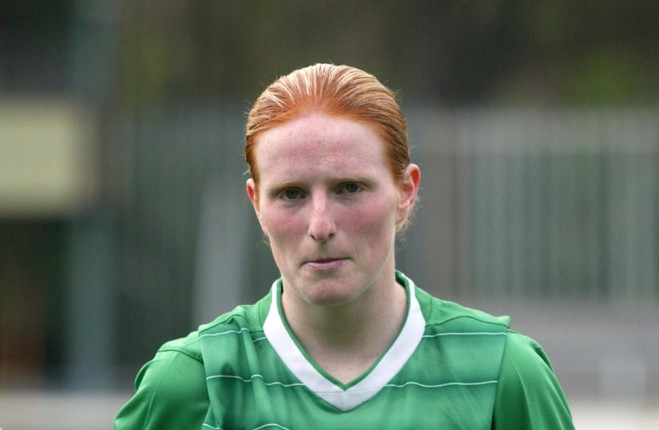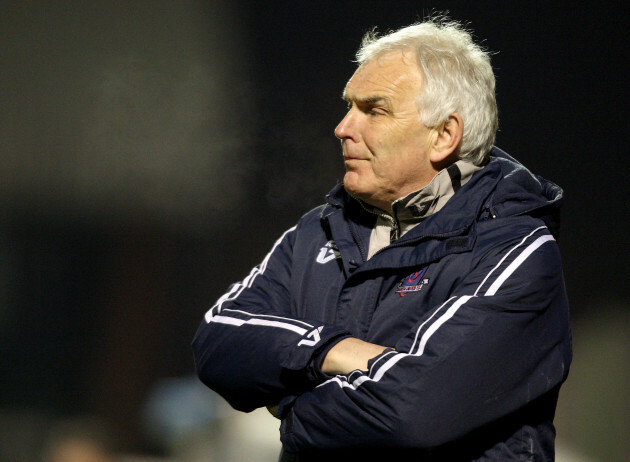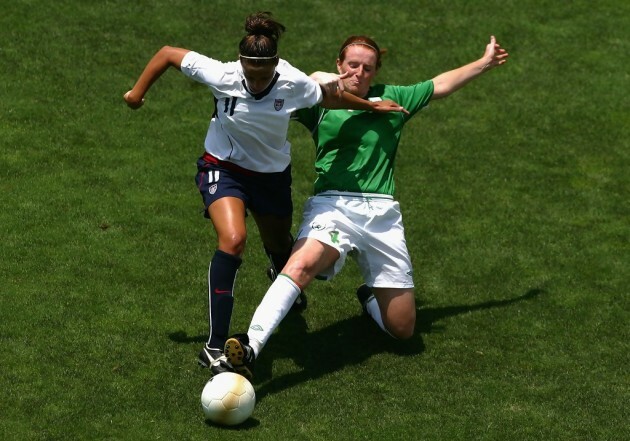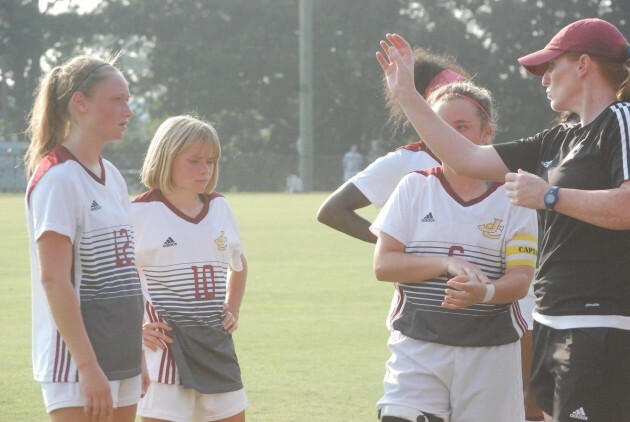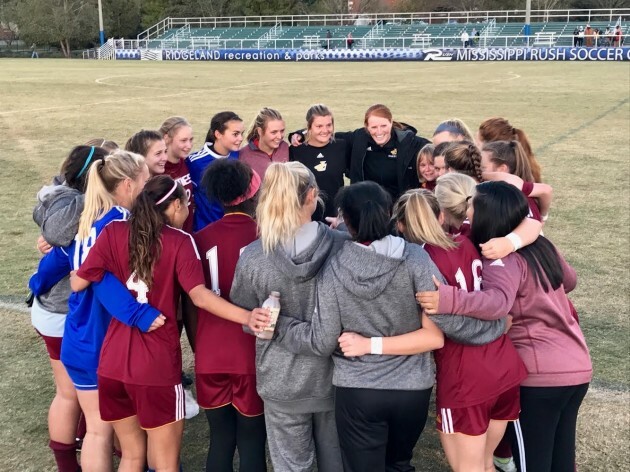SHE MAY ONLY be 38, but the women’s football scene that Dolores Deasley was part of already feels like a different era.
She emerged from Drumkeen, a small village in Donegal, initially acquiring the sport’s basic skills while playing out on the street with her cousin.
By virtue of the fact that she was the only girl with a love of soccer “for miles,” she joined the local boys team at U10 level, and continued on to U12s and U14s.
Two coaches, Willie Boyle and Catherine Cook Harkin, were key figures in helping Deasley reach her potential, with the latter encouraging her to go for Irish try-outs as a teen.
Were it not for their influence, it seems unlikely Deasley would be where she is today, coaching soccer in America.
The ninth of 10 children, like her, Deasley’s brothers all played for Drumkeen United at one point, although they were considerably older and had jobs by the time of her rise in the sport.
For a small area, Drumkeen has produced a decent number of footballers – Ryan McGavigan, who played in the underage set-up at Leicester City and former Finn Harps player Niall Bonner among them. Until Deasley came along, however, it had never been home to an Irish international.
Our little village, it’s like anywhere in Ireland, everybody knows you and back then, it was no different,” Deasley tells The42. “The boys always looked after me. I was very tall and was probably pushing most of them around. They were proud to have a girl on their team, there was nothing [untoward]. I’d probably be one of the better players as well — you get a bit more respect that way.
“They were very supportive of me — Willie, the manager, Tom Bonner, the caretaker of the club, who’s passed away now. Anytime I was getting on different Irish teams, Tom always made sure the club got me a new pair of boots. He was just so proud that a girl from their club was on the Irish team.”
After try-outs in Donegal in her early teens, she progressed to further trials in Dublin.
“That was really the first time I experienced so many more girls that were all really good at playing football,” she recalls. “I suppose you got a wee bit nervous then. Caroline Thorpe, Elaine O’Connor and Susan Heapes would have been the first girls I remember, all brilliant footballers.
“So I went through the try-outs as homesick as could be. I was only 14 at the time, off to Dublin for the weekend on my own. I didn’t really think anything of it. A few weeks later, a letter came in the post from Sean Brodie saying I’d been selected — I think it was Scotland we went to. That was April ’96, playing U16.
“I had always played as a centre mid growing up. Pat Kavanagh was manager of that first squad. He had me playing as a centre-back. And from there, that was my position.”
It wasn’t long before Deasley was thrown in at the deep end. In 1999, she was part of an Irish senior squad who travelled to face USA, the side that had recently been crowned world champions, at Foxboro Stadium in Massachusetts.
Deasley was one of a handful of youngsters invited along as part of the trip by manager Mick Cooke, purely for experience rather than game time, or so they thought.
“I was 17 and I was wearing number 17,” she remembers.
“Something must have happened or somebody pissed Mick off, and lo and behold, he calls me in and basically tells me I’m starting at centre-back.
“There was over 30,000 people there at Foxboro. That was our first taste of the big scale of things. I did okay. We got hammered, but I suppose Mick was happy enough with the progression of the young girls that he brought in.”
The following year, Deasley would join fellow Irish player Elaine O’Connor at Hofstra University in New York, undertaking an undergraduate degree in PE teaching.
After graduating in 2004, following a tip-off from a friend, she began working as a graduate assistant to head coach Gail Macklin — who is now the Irish Football Association’s Women’s Domestic Football Manager — at the University of Southern Mississippi. In tandem with this apprenticeship job, the university paid for her master’s in sports administration.
Deasley had been playing for the Irish team throughout this period, though upon graduation, was informed by then-manager Noel King that full-time football at club level would be required to continue getting picked for internationals.
A short-lived move to Bristol Rovers ensued, where she linked up with Irish team-mates Claire Scanlan and Grainne Kerins.
“But my heart was always back in New York,” she explains. “So I finished out the season there. And of course, the summer leagues were starting [in the US], so in my mind, I was playing full-time football. I came back and was playing for the Long Island Fury.”
Deasley’s Ireland career, though, ended at the young age of 25. Her last game was a 3-0 defeat against Germany at Richmond Park amid a World Cup qualifier in August 2006. She came off in the first half, having suffered a torn meniscus.
I had the surgery then and was getting ready to go to the Algarve [for a training camp] the next spring. And it was a bit disappointing, after all the years that I had played, just to basically get an email saying: ‘We’re not bringing you back for this one.’ And that was kind of it.”
“I think I was just short of 50 [caps], because I remember saying it would have been really nice to get to 50. I was getting to the stage where I had started a career in coaching. I didn’t want to move home, I wanted to stay in America, it was a matter then of getting a work visa. I knew it was going to be extremely difficult for an employer to employ me and then me asking to go home to play, especially when you were playing those qualifying rounds. You were gone a week, or two weeks, at a time.
“But I would have just liked it to have been on my terms, to say: ‘I’m hanging up the boots now and I’m moving on to something in coaching.’”
She continues: “You had massive withdrawal symptoms. I was busting my ass from the time I got the surgery. I had got myself a full-time personal trainer that I was training with every day to be ready to go to the Algarve. That was my goal. I remember being in touch with Noel King, telling him: ‘This is what I’m doing every day, getting ready to come back.’ I was in good shape, ready to go, excited to get back on the field again.”
Deasley says she was informed by email that her sevices would no longer be required.
“My plan had pretty much got chopped in two. It was a feeling of failure and also of: ‘What do I do now?’
“You felt empty. For so long, that was all I knew. Everything I was doing was gearing up towards the next trip with the Irish team to represent my country.
“I felt I had done more than enough to be there. But obviously, the manager had another plan and you have to accept that. It’s the brutality of the game.”
Deasley later adds via email that she doesn’t want to seem naive and understands it’s the nature of football, but feels the situation could have been handled better.
“After over 10 years of service and commitment to the Irish set-up, the manager couldn’t even pick up the phone and have a conversation and explain his reasoning. Not that he has to explain, but it all comes back to people-management skills at the end of the day.”
Deasley acknowledges she could potentially have won her place back in the national team, had she opted to forego the opportunities available to her in America and try to sign for a club closer to home, but that too would have come at a potentially significant cost.
“It was either stay and make a career of coaching, if I really wanted to stay in the States, or I was having to move somewhere to play. But with no guarantee of finances coming in, how was I going to be able to support myself?
It was going to be a huge gamble to look at going home and maybe going to England. That wasn’t really a path I wanted to take. At that stage, we were getting €25 to €30 a day to travel with the Irish team. If you were somebody that was leaving work without pay for a week or two to go represent your country, you weren’t getting compensated whatsoever.
“It was a tough time for girls trying to decide: ‘Do I give up my work for the love of playing and representing my country?’ It was just that fine line for me of: ‘I’m trying to start a career here, I can keep playing football not knowing where I’m going to be, where money’s going to come from and how I’m going to live and support myself, or I have an opportunity for a full-time job and I can do really well out of it if I don’t screw it up in the meantime.’
“It was a no-brainer really, with the opportunity I was given. At that time, they were sponsoring my visa as well, so something was going to have to give.
“Had I moved somewhere to play full-time football, I probably would have worked my way into the squad. But for me, it [came down to] just the unknown of not being able to support myself and possibly moving countries.”
Consequently, that email felt like a watershed moment. Like so many female footballers and particularly before the English Super League went professional, Deasley was forced to make the difficult decision of choosing between high-level football versus a more financially stable career.
“I think [my life] could have been extremely different. I do firmly believe everything happens for a reason. I’m in a really good place now, things have just fallen in line the last couple of years, through a lot of hard work and just getting the head down and getting on with it.
“It was disappointing for me [how it ended with Ireland], but I would have no hard feelings at this stage, especially being a coach myself. I understand all the processes that go in place to make these decisions.
“It was also a big part in my growth as a person, overcoming that and moving on and just being stronger for it.”
Of course, the well-documented restrictions and limitations imposed on female footballers at the time, particularly with Ireland, were similarly frustrating if somewhat typical in that era.
You go back to the whole [controversy] about the gear they had there a few years ago. That just came with the territory back when we were playing. You landed in Dublin Airport, you had to go into the bathroom and give your tracksuit back. We got to keep jerseys and stuff like that, but never once were we given a tracksuit to travel in or hold onto.
“We didn’t really know any different. We weren’t going to fight it. We were just happy, felt privileged to be there and represent our country.
“For older girls at the time, it was a struggle for them. I remember the likes of Livvie [Olivia O'Toole], who would have been working full-time, [whereas others] would have been students. Those were girls that were giving up money and finances to be able to represent their country and never were funded.
“And that became me in 2005 and 2006, when I started working. You’re leaving work for a long time and you did it for the opportunity to represent your country. You didn’t complain about it, you just got on with it.”
Yet Deasley has “no regrets”. These days, she is coaching at Jones College in Mississippi in the role of Head Women’s Soccer coach.
Just as Boyle and Cook helped her progress in the sport all those years ago, she is now undertaking a similar role, arranging daily sessions and overseeing talented girls, mostly in their late teens, who have a passion for the game.
“We do it all. Your practice planning, your team travel and then since you’re in a college, you’re also making sure they’re performing in the classroom. On top of that, you’ve got 24 different personalities of 18-19-year-old girls. So that in itself is a full-time job, managing people and making sure they’re happy.
“I love to develop them. I love to watch them improve and get better. The thrill of getting them to what their goal is after two years and getting picked up then by a bigger four-year uni.
“We’re dealing with players that are very immature at times. So to just watch them, it sounds a bit cheesy, grow into good young women as well [is rewarding].”
Though she usually gets to visit home twice a year, every Christmas and summer, Deasley is settled in America now and has come a long way from that 14-year-old who felt homesick when having to spend a weekend on her own in Dublin.
“I got my citizenship status last year, so that was a big deal, and that was through the support of my boss, helping me do my green card.
Then, as far as the people go, it’s like a home away from home. It’s a laid-back way of life, they don’t take things too seriously, they’re friendly. You walk down the street in New York and nobody is saying ‘hello’ to you, but you walk down a street in Mississippi, it’s like walking down a street in Donegal. People wave or acknowledge you, I like that. Even in work, it’s the type of place where nobody’s going to say: ‘That’s not my job description, I’m not going to do that.’
“And I talk about the disappointment of not getting re-selected for the Irish team, but those are some of the best years, the travelling we did and all the different players we got to play with.
“We actually have a Zoom call this Friday with a bunch of girls: Olivia O’Toole, Elaine O’Connor, Edel Malone, players from all the different age categories. So they’re still some of my best pals.”
Bernard Jackman and Murray Kinsella join Gavan Casey to discuss the latest rugby news, with a focus on Tyler Bleyendaal, James Cronin, Robin Copeland and disaster Down Under
The42 Rugby Weekly / SoundCloud
